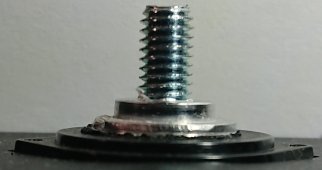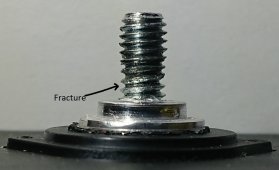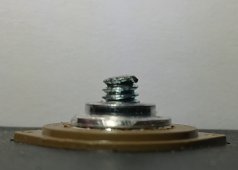pelicanpebble
New Member
- Joined
- Sep 4, 2022
- Messages
- 13
I got 8 EVE LF304 from Amy at Docan Power. Before assembling the cells, I asked her what torque to use to avoid damaging the welded terminals. Her answer was: "The normal torque <6N.m"
To be safe, I set my torque wrench to 5 Nm. While tightening the nuts I encountered an odd phenomenon: As I was tightening the nut the resistance became greater. OK so far. But as I continued to tighten to reach the set torque, I found the resistance of the nut DECREASING. I was stumped but decided is was probably the thin connections for the BMS settling into place. After continuing to turn a bit more, the torque wrench triggered. All seemed fine.
It went like this for 6 cells. - On the 7th cell, the bolt snapped right off. I.e. the core material of the bolt broke. It did not pull out the bolt from terminal as you often read.
I opened one of the previously tightened bolts and found the reason for the decreasing resistance: The bolts have all elongated, thinned and started to fracture! The bolts are fracturing between the base and the position where the nut was. Where the nut was, the bolt is perfectly fine.
WTF? Did anybody else experience this with Docan Power supplied cells? I was so stunned that I went and had my torque wrench checked at a local machine shop: It works perfectly fine. It was even a bit conservative measuring in at 4.8 Nm.
Was the 6 Nm torque recommendation the problem? Did anybody else use 5 Nm or 6 Nm successfully? Or did I have the unfortunate experience of receiving cells with bolts that were of lower quality than Docan Power was intending to use? How can a M6 stainless steel bolt break that is sitting in aluminium rather than just pull out? Are they made of butter? I am not even remotely strong enough to break an M6 stainless steel bolt.
I contacted Amy at Docan Power with a request to replace the cells under warranty. I am curious to see how that goes.
In case anybody is interested, here are some pictures. Sorry for the quality in two of them. I could not get it to focus properly for every picture no matter how much I tried.
Picture 1: Undamaged bolt (cell 8 which was not yet assembled)

Picture 2: Bolt that exhibited decreasing resistance to tightening the nut: Bolt is stretched and has started breaking.

Picture 3: Broken off bolt.

To be safe, I set my torque wrench to 5 Nm. While tightening the nuts I encountered an odd phenomenon: As I was tightening the nut the resistance became greater. OK so far. But as I continued to tighten to reach the set torque, I found the resistance of the nut DECREASING. I was stumped but decided is was probably the thin connections for the BMS settling into place. After continuing to turn a bit more, the torque wrench triggered. All seemed fine.
It went like this for 6 cells. - On the 7th cell, the bolt snapped right off. I.e. the core material of the bolt broke. It did not pull out the bolt from terminal as you often read.
I opened one of the previously tightened bolts and found the reason for the decreasing resistance: The bolts have all elongated, thinned and started to fracture! The bolts are fracturing between the base and the position where the nut was. Where the nut was, the bolt is perfectly fine.
WTF? Did anybody else experience this with Docan Power supplied cells? I was so stunned that I went and had my torque wrench checked at a local machine shop: It works perfectly fine. It was even a bit conservative measuring in at 4.8 Nm.
Was the 6 Nm torque recommendation the problem? Did anybody else use 5 Nm or 6 Nm successfully? Or did I have the unfortunate experience of receiving cells with bolts that were of lower quality than Docan Power was intending to use? How can a M6 stainless steel bolt break that is sitting in aluminium rather than just pull out? Are they made of butter? I am not even remotely strong enough to break an M6 stainless steel bolt.
I contacted Amy at Docan Power with a request to replace the cells under warranty. I am curious to see how that goes.
In case anybody is interested, here are some pictures. Sorry for the quality in two of them. I could not get it to focus properly for every picture no matter how much I tried.
Picture 1: Undamaged bolt (cell 8 which was not yet assembled)

Picture 2: Bolt that exhibited decreasing resistance to tightening the nut: Bolt is stretched and has started breaking.

Picture 3: Broken off bolt.



